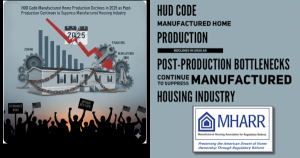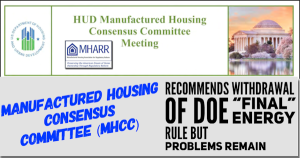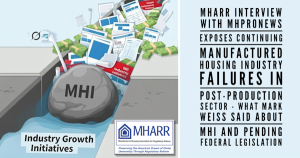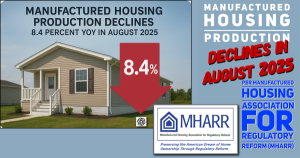Federal Guidance Adds Manufactured Home Retailers, Transporters, and Installers as Essential Workers as Sought by MHARR
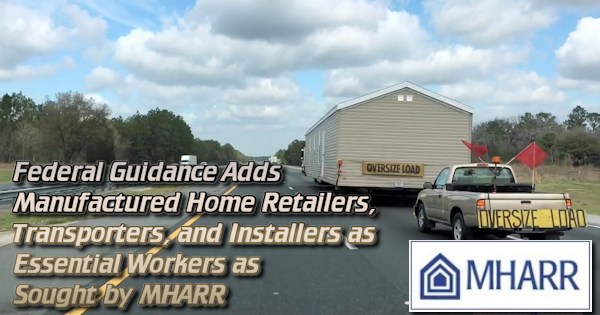
The most recent update to the federal government’s guidance on “essential” workers for purposes of COVID-19 “Stay-at-Home” orders, issued by the U.S. Cybersecurity and Infrastructure Security Agency (CISA) on May 19, 2020 now specifically includes “workers … supporting the sale, transportation and installation of manufactured homes” (in addition to manufactured housing construction workers) see, copy attached at p. 20 as requested by MHARR in April 3, 2020 correspondence to HUD Secretary Ben Carson and CISA Director Christopher Krebs.
Although previous CISA guidance could be construed as implicitly including post-production elements of the manufactured housing chain of sale and distribution as “essential” workforce components, as urged by others in the industry, that did not stop certain key states from forcing the closure of manufactured housing retail centers and related businesses. This led MHARR, in its April 3, 2020 communication, to state:
“While we construe [prior CISA] language – and believe that it was fully intended by CISA – to include both the production and sale of HUD Code manufactured homes to American consumers (as well as other necessary related functions, including the transportation and installation of HUD-regulated manufactured homes), the language of some state stay-at-home orders could, unfortunately, be interpreted as not including manufactured housing retail establishments within their definition of “essential” economic or infrastructure activity. Within the unique context of the manufactured housing industry, however, where independent retailers are an indispensable component of the chain of distribution between producers and consumers, it is essential both for American consumers of affordable housing and all other sectors of the HUD Code industry, that local-level manufactured housing retailers be permitted to remain open and fully-operational.”
With the now-specific inclusion of the various elements of the manufactured housing consumer sales and distribution system in the federal government’s over-arching COVID-19 guidance, there may be a better opportunity to advance the easing of remaining restrictions on such activity in certain states and/or localities.
MHARR will continue to closely monitor this situation, and take further steps as warranted.
cc: Other Interested HUD Code Industry Members

The most recent update to the federal government’s guidance on “essential” workers for purposes of COVID-19 “Stay-at-Home” orders, issued by the U.S. Cybersecurity and Infrastructure Security Agency (CISA) on May 19, 2020 now specifically includes “workers … supporting the sale, transportation and installation of manufactured homes” (in addition to manufactured housing construction workers) see, copy attached at p. 20 as requested by MHARR in April 3, 2020 correspondence to HUD Secretary Ben Carson and CISA Director Christopher Krebs.
Although previous CISA guidance could be construed as implicitly including post-production elements of the manufactured housing chain of sale and distribution as “essential” workforce components, as urged by others in the industry, that did not stop certain key states from forcing the closure of manufactured housing retail centers and related businesses. This led MHARR, in its April 3, 2020 communication, to state:
“While we construe [prior CISA] language – and believe that it was fully intended by CISA – to include both the production and sale of HUD Code manufactured homes to American consumers (as well as other necessary related functions, including the transportation and installation of HUD-regulated manufactured homes), the language of some state stay-at-home orders could, unfortunately, be interpreted as not including manufactured housing retail establishments within their definition of “essential” economic or infrastructure activity. Within the unique context of the manufactured housing industry, however, where independent retailers are an indispensable component of the chain of distribution between producers and consumers, it is essential both for American consumers of affordable housing and all other sectors of the HUD Code industry, that local-level manufactured housing retailers be permitted to remain open and fully-operational.”
With the now-specific inclusion of the various elements of the manufactured housing consumer sales and distribution system in the federal government’s over-arching COVID-19 guidance, there may be a better opportunity to advance the easing of remaining restrictions on such activity in certain states and/or localities.
MHARR will continue to closely monitor this situation, and take further steps as warranted.
cc: Other Interested HUD Code Industry Members


